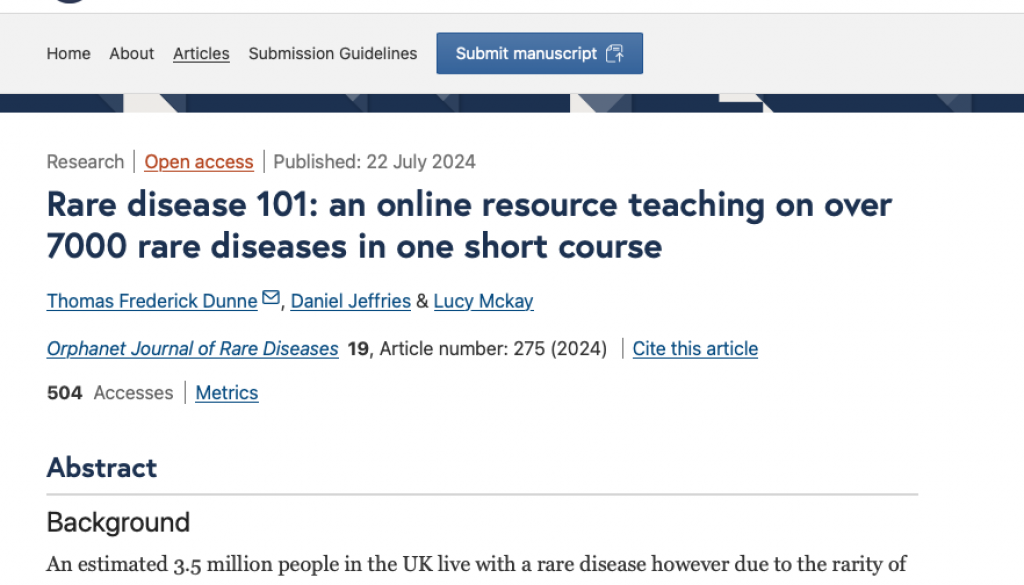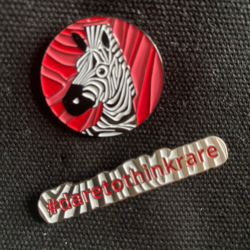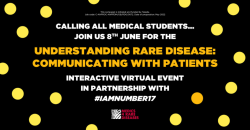M4RD’s Rare Diseases 101 Study
Published in the Orphanet Journal of Rare Diseases
Medics4RareDiseases is proud to announce another publication within the Orphanet Journal of Rare Diseases! The study evaluates Rare Diseases 101, an online training designed and created by M4RD with the assistance of the rare community. We would like to give a huge shout out to Dr Thomas Dunne and our trustee, Dan Jeffries, who performed the evaluation and authored the study, alongside M4RD’s CEO, Dr Lucy McKay.
Rare Diseases 101 is a free, flexible and interactive e-learning course for healthcare professionals. It was launched in 2021 with modules delivered via the M4RD Learn platform. It provides patient-centred rare disease education with lessons on novel topics ranging from the diagnostic odyssey and common challenges faced by those with rare conditions, through to the role of genomics, patient advocacy groups and education. The programme that hosts the course or ‘Learning Management System’ (LMS) allows for feedback to be collated and analysed. This feedback formed the basis of the study.
Dedicated rare disease education is largely missing from most medical school and post-graduate curriculums. M4RD created Rare Diseases 101 to help raise healthcare professional awareness to suspect rare disease and then support them with educational tools to help holistically manage rare patients. Evaluating feedback from those who have completed the course provides an opportunity for M4RD to continually improve and grow the programme. Since the Rare Disease 101 was launched, M4RD has added two further courses to the platform: Clinical Trials and Early Access Programmes; Mental Health and Rare Disease. After a request from the Australian Government Department of Health and the RArEST project the original Rare Disease 101 course was adapted for healthcare professionals working in an Australian healthcare context.
Online Searches and Literature Review
Before the feedback was evaluated, the team carried out extensive online searches, to see what pre-existing rare disease learning resources are currently available. This included:
- Literature review via MEDLINE, Pub-Med Central and Bookshelf.
- Google Scholar and Google searches
- Commonly used online clinical platforms including Patient.info, BMJ Best Practice, GP Notebook and NICE CKS were also searched.
Searches highlighted the uniqueness of Rare Diseases 101 as a disease- agnostic, patient-centred training resource, that is interactive and user-friendly for time-sensitive clinicians and students. Crucially, it is clinically focussed and does not target a specific area of rare disease medicine, such as research or drug development.
User Feedback
On completion of the study, there were 942 individuals who had signed up to take the course, 22% of whom had completed the entirety of the course modules. It is important to note that many more have completed core modules but not performed the feedback so aren’t marked as complete!
Over two thirds (37%) of those who had completed the course were medical professionals, over a quarter (28%) were medical students and 12% were allied healthcare professionals. 16% of those who completed the course provided formal online feedback that was resoundingly positive.
76% rated Rare Disease 101 as ‘excellent’ and the remainder rated it as ‘good’. 88% stated that it was applicable to their clinical practice with over half (55%) stating it was ‘extremely’ applicable.
All users reported that the course was useful in raising awareness of the challenges of living with a rare condition, for healthcare professionals, with over half (58%) stating it was ‘extremely useful’. These results are not just encouraging but justify the need for such a specialised educational resource.
Dr Thomas Dunne, paediatrician at North West School of Paediatrics said: “It’s been a privilege to contribute to Rare Disease 101, a vital resource filling a gap in rare disease education. From the start, I saw its potential to support clinicians in navigating the complexities of rare disease diagnosis. Watching it evolve into a comprehensive tool that aids in shortening the diagnostic odyssey has been incredibly rewarding. Thanks to everyone involved!
I’m humbled that our article has been accepted by a prestigious journal in the field of rare diseases. I hope this resource continues to support, educate and empower clinicians to #DareToThinkRare.”
Dan Jeffries, M4RD Trustee, co-author and developer of the RD 101 said: “Being part of Rare Disease 101, from its inception to its execution, has been an incredible journey. Living with two rare medical conditions myself, I deeply understand the vital role this publication plays. If it helps just one person receive an earlier diagnosis, all our efforts will be worth it. Since 2006, I’ve been passionate about online learning and the transformative power of open-source platforms like Moodle, and RD101 stands as one of my proudest accomplishments. A huge congratulations to Lucy, Tom, and the entire M4RD team for making this possible. Dare to think rare.”
Dr Lucy McKay, CEO of M4RD said: “Healthcare professional training is one of the key pillars of M4RD. There is only so much in-person training that we can physically facilitate. RD101 provides a platform for busy clinicians and students to learn flexibly, at their own pace. We have designed the course carefully, to cover key topics in digestible ‘chunks’ to help support clinicians when faced with a person with a rare condition. The feedback we have achieved so far has been really encouraging and we look forward to furthering the reach of the programme over the coming years. We are delighted to have this study published and would like to thank all those within the rare community that gave their time to help us to develop Rare Disease 101and the M4RD Learn platform”.
The full article in the Orphanet Journal of Rare Diseases can be accessed here.
Sign up to the M4RD Learn platform for free here to start Rare Disease 101.




